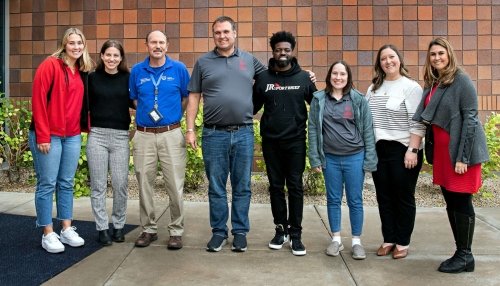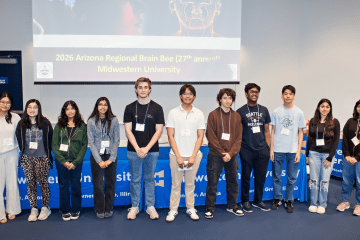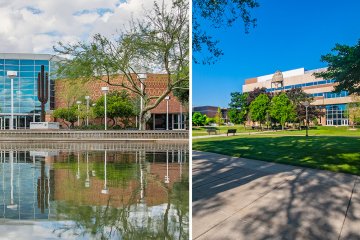Special Olympics/CBS Radio Event Fosters Inclusive Healthcare for Individuals with Intellectual Disabilities
Special Olympics and Inclusive Health event helps raise awareness.

Midwestern University students learn more about the health disparities that people with intellectual disabilities face and the importance of providing inclusive care.
There is a popular myth that people with intellectual disabilities receive better healthcare than the general population. Unfortunately, this couldn’t be further from the truth. In fact, people with intellectual disabilities are more likely to die on average 15 – 20 years sooner than those without. While this is a complex issue, one of its many layers is the fact that most healthcare providers have not been trained to provide inclusive healthcare that encompasses patients with intellectual disabilities.
Eunice Kennedy Shriver saw the disparities that this population faces, and sought to rectify that by establishing a sports camp for local children with intellectual disabilities in the 1960s. Not long after it began, the camp grew to be what we now know as the Special Olympics. From its conception, Special Olympics aims to provide children and adults with intellectual disabilities the opportunities to participate in sports, develop physical fitness, and foster an environment of competition that focuses on people’s abilities, not their disabilities. With chapters in all 50 states and across the world, Special Olympics is now spearheading another campaign: promoting inclusive health and ensuring individuals with intellectual disabilities have access to the care they deserve.
To help raise awareness, JR Jackson of CBS Radio has been visiting colleges and universities across the country, bringing the message of Special Olympics and inclusive health, and amplifying the voices of athletes with intellectual disabilities. On December 13, Mr. Jackson, a sports reporter, and Special Olympics Arizona (SOAZ) held a conversation with students at Midwestern University’s Glendale Campus. He highlighted the health disparities that people with intellectual disabilities face, as well as the importance of educating healthcare professionals on how to provide inclusive care.
The conversation was also joined by Midwestern University faculty members who are heavily involved with the Healthy Athletes Program through SOAZ. This program provides needed health services to participants at event-based screenings, and gives healthcare students the opportunity to learn more about how to care for patients with intellectual disabilities.
“I am the Clinical Director for Special Olympics Arizona’s Health Athletes FUNfitness Program, which provides free physical therapy screenings and education to athletes,” said Suzanne O’Neal, PT, D.P.T., D.H.Sc., Associate Professor, Doctor of Physical Therapy Program. “Several times a year, a group of Midwestern physical therapy students participate in these screenings. This provides students with invaluable exposure to people with intellectual disabilities and eliminates and changes some preconceived notions they may have had about the population. The more we expose healthcare students to various underserved populations, the more comfortable they will be in the future to treat them, therefore improving inclusivity in healthcare.”
Cara Copeland, M.S., M.Ed., D.M.D., Associate Professor, College of Dental Medicine – Arizona said: “As the lead of Special Smiles for Midwestern University, I maintain a relationship with SOAZ to enable our students and faculty to help with dental exams and education at the fall and summer games, as well as bring in Special Olympics representatives and athletes as guest lecturers with our second-year dental students. The opportunity for our students to gain experience working with this wonderful population is invaluable, as we need to be able to care for the oral health of all patients in the community.”
Angela Breitmeyer, Psy.D., CMPC, Associate Professor, Behavioral Science, Doctor of Clinical Psychology Program, wrapped up the event by saying: “Inclusive healthcare is important because everyone deserves to feel healthy, happy, safe, and supported. These are the core values promoted here at MWU, within SOAZ, and across all healthcare disciplines represented here at MWU.”



